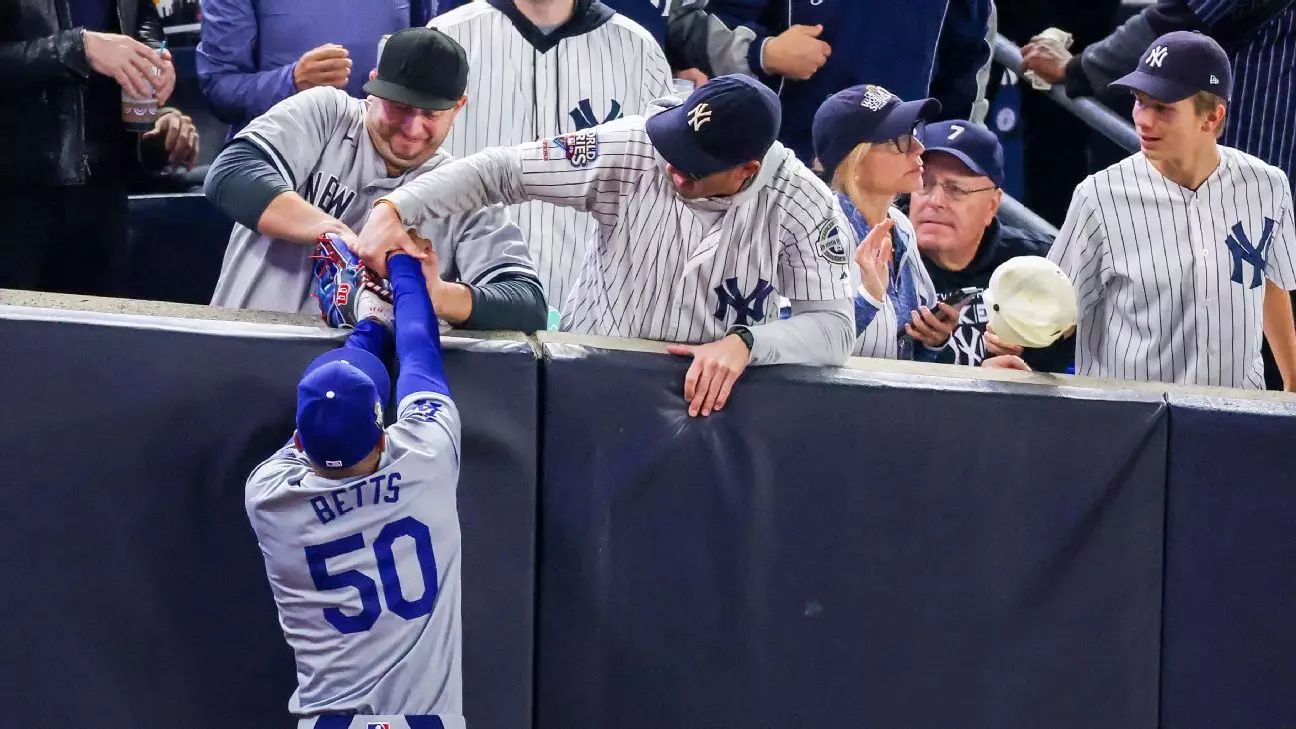In the heart of the Bronx at Yankee Stadium, an unusual incident unfolded during Game 4 of the World Series that stirred emotions, raised eyebrows, and played a pivotal role in the game. This particular event showcased not just a moment of chaos but also the often muddied lines between fan engagement and player interference. As the drama unfolded, two fans were ejected after engaging with Los Angeles Dodgers’ right fielder Mookie Betts in a manner that attracted widespread criticism and fascination alike.
It began with a routine play that unexpectedly spiraled into a controversial episode. Mookie Betts, known for his prowess on the field, leapt into foul territory in a bid to secure a popup hit by Gleyber Torres. In a shocking simultaneous act, a fan named Austin Capobianco reached into Betts’ glove, pulling the ball out just as the Dodger was about to stash it safely. This audacious move did not go unnoticed and triggered an immediate response from both official umpires and a livid Betts, highlighting the palpable tension that can manifest in high-stakes games.
The decision to eject Capobianco and his companion, John Peter, was swift. The right-field umpire ruled the play as fan interference, instantly declaring Torres out and extinguishing any further potential for the Yankees in that inning. This incident not only overshadowed the play itself but also posed questions about the responsibilities and conduct of fans during games where every moment counts.
The Fan’s Justification
Capobianco, a die-hard Yankees fan and season-ticket holder, had a perspective to share after the game. His justification shone a light on a fan culture that often embraces the idea of doing whatever it takes to support one’s team. “We always joke about the ball in our area,” he remarked, revealing a delusion of honor among the most zealous fans. Classifying their actions as ‘defending’ the territory, Capobianco depicted a scenario where engaging with players seemed almost like sporting comradery, though the appropriateness of such behavior is highly debatable.
In light of the incident, Betts chose to downplay the situation in his post-game comments, illustrating a level of professionalism that is often crucial in high-pressure environments. “When it comes to the person in play, it doesn’t matter,” Betts maintained, reflecting a broader understanding that criticism and distractions should not cloud the essence of the game itself. This temperament displayed by Betts is representative of how professional athletes navigate not only the physical demands of the game but also the psychological challenges posed by fans and external interference.
The Broader Implications for Fan Conduct
The incident at Yankee Stadium ignites a conversation about the boundaries of fan engagement. Sports, by nature, cultivate passionate followers who dedicate themselves to the success of their team. However, defining where enthusiasm crosses the line into interference remains a convoluted issue. Various sports leagues are regularly seen grappling with fan behavior, and this episode serves as a stark reminder that actions perceived as harmless by some can have real consequences on the game and its players.
As more such incidents unfold in sports culture, the need to establish clear guidelines for fan interaction is vital. It calls into question not only the fans’ sense of entitlement in their pursuit of participation in the game but also the obligation of venues to ensure a safe and distraction-free experience for the players.
As the dust settled from this unexpected altercation, the Yankees eventually triumphed over the Dodgers, ultimately winning 11-4 despite the earlier incident. Although Capobianco and Peter were escorted from the stadium, they were promised re-entry for the next game, a gesture that underscores the complex relationship between fans and the sport itself. Such a promise highlights the ongoing challenge of distinguishing between spirited enthusiasm and conduct that potentially undermines the integrity of the game.
The episode at Yankee Stadium serves as a cautionary tale for fans, emphasizing the importance of maintaining respect for the players while showing support for their teams. It is an intricate balance that enhances the experience without detracting from the game’s integrity or spirit. As the World Series unfolds, it offers an opportunity for reflection on what it truly means to be a fan.


Leave a Reply